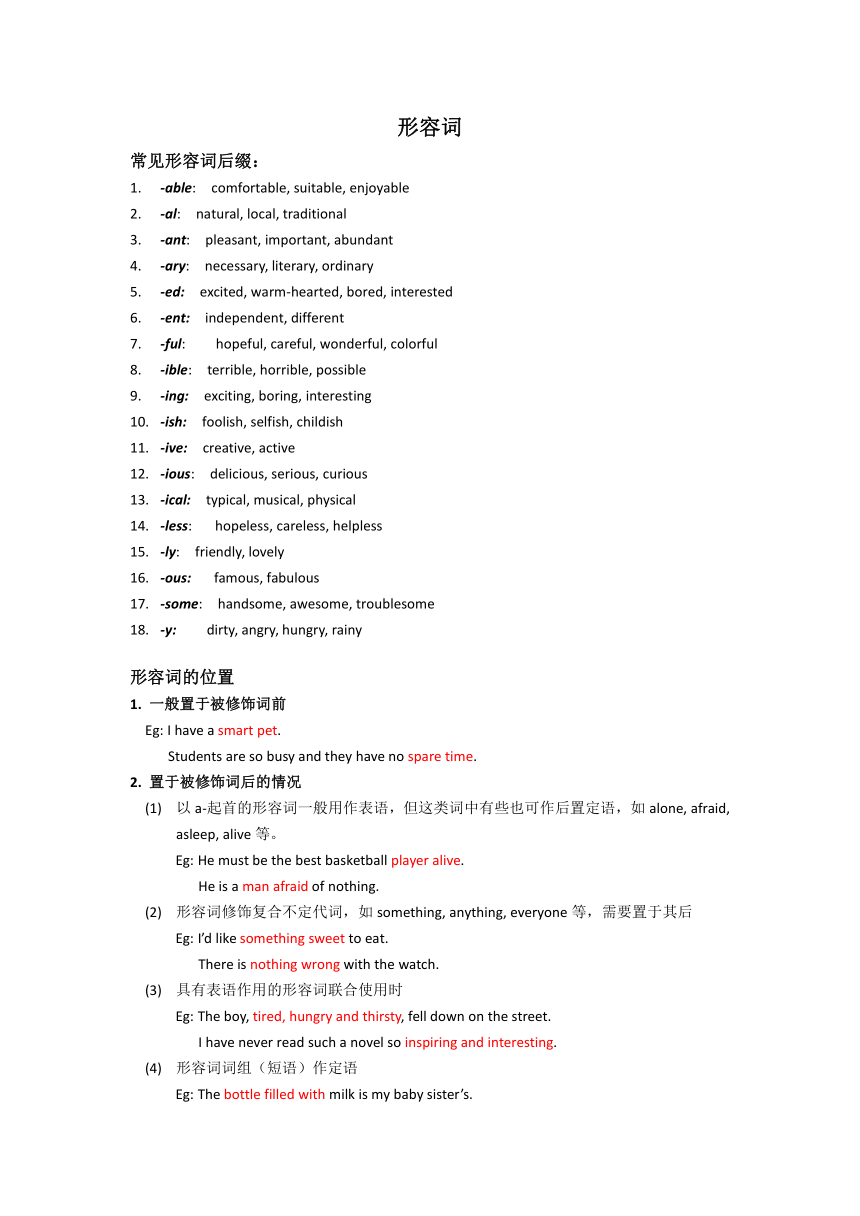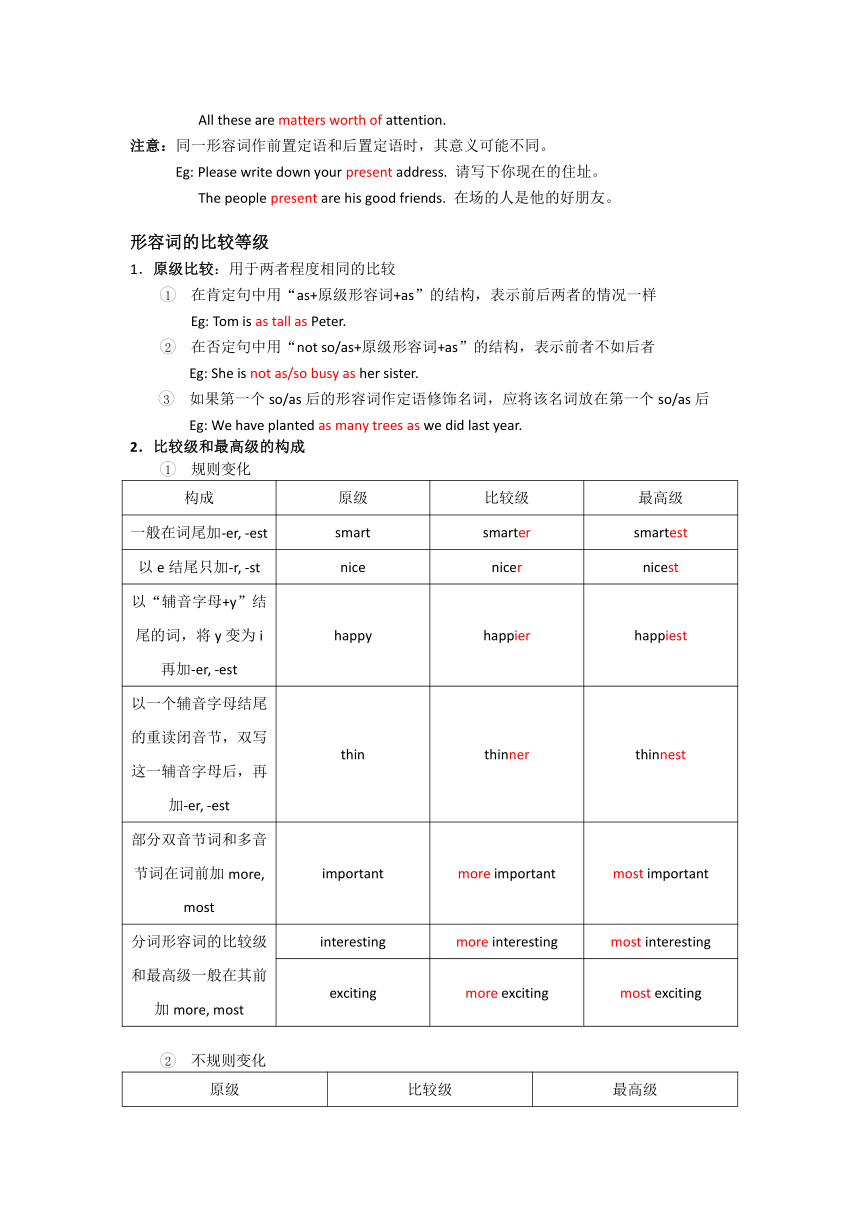2024届中考英语专项复习模块一词汇:3.形容词(含答案)
文档属性
| 名称 | 2024届中考英语专项复习模块一词汇:3.形容词(含答案) |  | |
| 格式 | docx | ||
| 文件大小 | 24.3KB | ||
| 资源类型 | 教案 | ||
| 版本资源 | 人教新目标(Go for it)版 | ||
| 科目 | 英语 | ||
| 更新时间 | 2023-08-22 08:15:12 | ||
图片预览


文档简介
形容词
常见形容词后缀:
-able: comfortable, suitable, enjoyable
-al: natural, local, traditional
-ant: pleasant, important, abundant
-ary: necessary, literary, ordinary
-ed: excited, warm-hearted, bored, interested
-ent: independent, different
-ful: hopeful, careful, wonderful, colorful
-ible: terrible, horrible, possible
-ing: exciting, boring, interesting
-ish: foolish, selfish, childish
-ive: creative, active
-ious: delicious, serious, curious
-ical: typical, musical, physical
-less: hopeless, careless, helpless
-ly: friendly, lovely
-ous: famous, fabulous
-some: handsome, awesome, troublesome
-y: dirty, angry, hungry, rainy
形容词的位置
一般置于被修饰词前
Eg: I have a smart pet.
Students are so busy and they have no spare time.
置于被修饰词后的情况
以a-起首的形容词一般用作表语,但这类词中有些也可作后置定语,如alone, afraid, asleep, alive等。
Eg: He must be the best basketball player alive.
He is a man afraid of nothing.
形容词修饰复合不定代词,如something, anything, everyone等,需要置于其后
Eg: I’d like something sweet to eat.
There is nothing wrong with the watch.
具有表语作用的形容词联合使用时
Eg: The boy, tired, hungry and thirsty, fell down on the street.
I have never read such a novel so inspiring and interesting.
形容词词组(短语)作定语
Eg: The bottle filled with milk is my baby sister’s.
All these are matters worth of attention.
注意:同一形容词作前置定语和后置定语时,其意义可能不同。
Eg: Please write down your present address. 请写下你现在的住址。
The people present are his good friends. 在场的人是他的好朋友。
形容词的比较等级
原级比较:用于两者程度相同的比较
在肯定句中用“as+原级形容词+as”的结构,表示前后两者的情况一样
Eg: Tom is as tall as Peter.
在否定句中用“not so/as+原级形容词+as”的结构,表示前者不如后者
Eg: She is not as/so busy as her sister.
如果第一个so/as后的形容词作定语修饰名词,应将该名词放在第一个so/as后
Eg: We have planted as many trees as we did last year.
比较级和最高级的构成
规则变化
构成 原级 比较级 最高级
一般在词尾加-er, -est smart smarter smartest
以e结尾只加-r, -st nice nicer nicest
以“辅音字母+y”结尾的词,将y变为i再加-er, -est happy happier happiest
以一个辅音字母结尾的重读闭音节,双写这一辅音字母后,再加-er, -est thin thinner thinnest
部分双音节词和多音节词在词前加more, most important more important most important
分词形容词的比较级和最高级一般在其前加more, most interesting more interesting most interesting
exciting more exciting most exciting
不规则变化
原级 比较级 最高级
good, well better best
many, much more most
little less least
bad, ill worse worst
far farther(只指距离) farthest(只指距离)
further(指距离也只程度) furthest(指距离也只程度)
old older(指年龄、新旧、血缘) oldest(指年龄、新旧、血缘)
elder(只指血缘) eldest(只指血缘)
比较级的用法
比较级+than
Eg: Jenny has more books than Jimmy does.
比较级+and+比较级
Eg: It’s getting hotter and hotter.
the+比较级..., the +比较级
Eg: The more you eat, the heavier you will be.
the+比较级(+of the two)
Eg: The larger of the two houses belongs to Miss White.
more than(多于), not more than(不比.....多), less than(少于), not less than(不少于......), less+形容词+than(不如......)
Eg: I think dogs are less cute than cats.
More than 500 students will attend the meeting.
使用比较级常见错误
比较的范围或对象出错
Eg: The length of Nile is longer than Yangtze River. (×)
The length of Nile is longer than that of Yangtze River. (√)
China is lager than any country in Asia. (×)
China is lager than any other country in Asia. (√)
China is lager than any country in Africa. (√)
“not+比较级+than”与“no+比较级+than”表达的意义完全不同。前者常常表示“一方不如另一方”,后者表示“双方都不......”
Eg: My Spanish is not better than you. 我的西班牙语不如你好。
My Spanish is no better than you. 我的西班牙语和你一样差。
比较级的修饰语: much, far, by far, still, even, no, any, a lot, a little, a bit, a great deal, rather, twice, two thirds等
Eg: He is even fatter than before.
Your apple is twice bigger than mine.
最高级的用法
the+形容词最高级+名词+表示范围的词组或从句
Eg: Her bike is the newest one in the neighborhood.
Frozen is the most interesting movie of the three ones.
one of the + 形容词最高级+课时数名词复数形式+表示范围的词组或从句
Eg: China is one of the largest countries in the world.
比较级形式表达最高级含义
Eg: Mr. Black is very glad because the clothes made in his factory have never been more popular.
She is taller than any other girl in her class.
=She is taller than the other girls in her class.
=She is taller than the rest of the girls in her class.
形容词的常用句型
It+be+形容词+of sb.+不定式(强调某人的品质)
Eg: It’s very kind of you to help me with my math.
It+be+形容词+for sb.+不定式(强调某物)
Eg: It’s difficult for me to learn physics well.
主语+be+形容词+不定式
Eg: Jack is always ready to help others.
易错形容词用法解析
good与well: good作定语和表语;well一般作表语,且只表示“身体好”,另外well还有副词词性。
Eg: Eating carrots is good for our eyes.
--How are you
---I’m very well.(我身体很好)
以-ing和-ed结尾的形容词:以-ing结尾的形容词一般修饰事物,而以-ed结尾的形容词则常常修饰人
Eg: The football game is exciting.
I’m excited.
elder和older: elder意为“年长的”,只指人,强调长幼关系,不用于than引导的比较状语从句中;older意为“年龄较大的,较旧的”,可指人和物。
Eg: She is my elder sister.
My elder brother is 5 years older than my younger sister.
单项选择。
1.The Forbidden City attracts a___stream of visitors every day.
A. constant B. main C. powerful D. shallow
2. There isn't an airport near where I live.The__one is about 90 miles away.
A. busiest B. farthest C. newest D. nearest
3.I know this plan is far from perfect, but I just can't think of___one.
A. a better B. the better C. a best D. the best
4.-It's one of the__ things in the world to stay with friends. -I agree. It always makes us relaxed.
A. worst B.happiest C. busiest D. hardest
5. -How are you getting along with your new classmates -Very well. They are all_____ me.
A. afraid of B. friendly to C. angry with D. sorry for
6. It's such an____ film that all the students are___in it.
A. interesting; interested B. interested; interesting
C. interesting; interesting D. interested; interested
7.To protect environment is__ to take care of our lives.
A. important B. the more important
C. the most important D. as important as
8. This film is much_than that one.
A. interesting B. more interesting
C. the most interesting D. very interesting
9. -Is the child any better today
-I think so.His temperature seems__ now.
A. high B. normal C.low D. special
10. The number of the trees around my village is getting__.
A, larger and larger B. higher and higher
more and more D. less and less
参考答案:
ADABB ADBBA
常见形容词后缀:
-able: comfortable, suitable, enjoyable
-al: natural, local, traditional
-ant: pleasant, important, abundant
-ary: necessary, literary, ordinary
-ed: excited, warm-hearted, bored, interested
-ent: independent, different
-ful: hopeful, careful, wonderful, colorful
-ible: terrible, horrible, possible
-ing: exciting, boring, interesting
-ish: foolish, selfish, childish
-ive: creative, active
-ious: delicious, serious, curious
-ical: typical, musical, physical
-less: hopeless, careless, helpless
-ly: friendly, lovely
-ous: famous, fabulous
-some: handsome, awesome, troublesome
-y: dirty, angry, hungry, rainy
形容词的位置
一般置于被修饰词前
Eg: I have a smart pet.
Students are so busy and they have no spare time.
置于被修饰词后的情况
以a-起首的形容词一般用作表语,但这类词中有些也可作后置定语,如alone, afraid, asleep, alive等。
Eg: He must be the best basketball player alive.
He is a man afraid of nothing.
形容词修饰复合不定代词,如something, anything, everyone等,需要置于其后
Eg: I’d like something sweet to eat.
There is nothing wrong with the watch.
具有表语作用的形容词联合使用时
Eg: The boy, tired, hungry and thirsty, fell down on the street.
I have never read such a novel so inspiring and interesting.
形容词词组(短语)作定语
Eg: The bottle filled with milk is my baby sister’s.
All these are matters worth of attention.
注意:同一形容词作前置定语和后置定语时,其意义可能不同。
Eg: Please write down your present address. 请写下你现在的住址。
The people present are his good friends. 在场的人是他的好朋友。
形容词的比较等级
原级比较:用于两者程度相同的比较
在肯定句中用“as+原级形容词+as”的结构,表示前后两者的情况一样
Eg: Tom is as tall as Peter.
在否定句中用“not so/as+原级形容词+as”的结构,表示前者不如后者
Eg: She is not as/so busy as her sister.
如果第一个so/as后的形容词作定语修饰名词,应将该名词放在第一个so/as后
Eg: We have planted as many trees as we did last year.
比较级和最高级的构成
规则变化
构成 原级 比较级 最高级
一般在词尾加-er, -est smart smarter smartest
以e结尾只加-r, -st nice nicer nicest
以“辅音字母+y”结尾的词,将y变为i再加-er, -est happy happier happiest
以一个辅音字母结尾的重读闭音节,双写这一辅音字母后,再加-er, -est thin thinner thinnest
部分双音节词和多音节词在词前加more, most important more important most important
分词形容词的比较级和最高级一般在其前加more, most interesting more interesting most interesting
exciting more exciting most exciting
不规则变化
原级 比较级 最高级
good, well better best
many, much more most
little less least
bad, ill worse worst
far farther(只指距离) farthest(只指距离)
further(指距离也只程度) furthest(指距离也只程度)
old older(指年龄、新旧、血缘) oldest(指年龄、新旧、血缘)
elder(只指血缘) eldest(只指血缘)
比较级的用法
比较级+than
Eg: Jenny has more books than Jimmy does.
比较级+and+比较级
Eg: It’s getting hotter and hotter.
the+比较级..., the +比较级
Eg: The more you eat, the heavier you will be.
the+比较级(+of the two)
Eg: The larger of the two houses belongs to Miss White.
more than(多于), not more than(不比.....多), less than(少于), not less than(不少于......), less+形容词+than(不如......)
Eg: I think dogs are less cute than cats.
More than 500 students will attend the meeting.
使用比较级常见错误
比较的范围或对象出错
Eg: The length of Nile is longer than Yangtze River. (×)
The length of Nile is longer than that of Yangtze River. (√)
China is lager than any country in Asia. (×)
China is lager than any other country in Asia. (√)
China is lager than any country in Africa. (√)
“not+比较级+than”与“no+比较级+than”表达的意义完全不同。前者常常表示“一方不如另一方”,后者表示“双方都不......”
Eg: My Spanish is not better than you. 我的西班牙语不如你好。
My Spanish is no better than you. 我的西班牙语和你一样差。
比较级的修饰语: much, far, by far, still, even, no, any, a lot, a little, a bit, a great deal, rather, twice, two thirds等
Eg: He is even fatter than before.
Your apple is twice bigger than mine.
最高级的用法
the+形容词最高级+名词+表示范围的词组或从句
Eg: Her bike is the newest one in the neighborhood.
Frozen is the most interesting movie of the three ones.
one of the + 形容词最高级+课时数名词复数形式+表示范围的词组或从句
Eg: China is one of the largest countries in the world.
比较级形式表达最高级含义
Eg: Mr. Black is very glad because the clothes made in his factory have never been more popular.
She is taller than any other girl in her class.
=She is taller than the other girls in her class.
=She is taller than the rest of the girls in her class.
形容词的常用句型
It+be+形容词+of sb.+不定式(强调某人的品质)
Eg: It’s very kind of you to help me with my math.
It+be+形容词+for sb.+不定式(强调某物)
Eg: It’s difficult for me to learn physics well.
主语+be+形容词+不定式
Eg: Jack is always ready to help others.
易错形容词用法解析
good与well: good作定语和表语;well一般作表语,且只表示“身体好”,另外well还有副词词性。
Eg: Eating carrots is good for our eyes.
--How are you
---I’m very well.(我身体很好)
以-ing和-ed结尾的形容词:以-ing结尾的形容词一般修饰事物,而以-ed结尾的形容词则常常修饰人
Eg: The football game is exciting.
I’m excited.
elder和older: elder意为“年长的”,只指人,强调长幼关系,不用于than引导的比较状语从句中;older意为“年龄较大的,较旧的”,可指人和物。
Eg: She is my elder sister.
My elder brother is 5 years older than my younger sister.
单项选择。
1.The Forbidden City attracts a___stream of visitors every day.
A. constant B. main C. powerful D. shallow
2. There isn't an airport near where I live.The__one is about 90 miles away.
A. busiest B. farthest C. newest D. nearest
3.I know this plan is far from perfect, but I just can't think of___one.
A. a better B. the better C. a best D. the best
4.-It's one of the__ things in the world to stay with friends. -I agree. It always makes us relaxed.
A. worst B.happiest C. busiest D. hardest
5. -How are you getting along with your new classmates -Very well. They are all_____ me.
A. afraid of B. friendly to C. angry with D. sorry for
6. It's such an____ film that all the students are___in it.
A. interesting; interested B. interested; interesting
C. interesting; interesting D. interested; interested
7.To protect environment is__ to take care of our lives.
A. important B. the more important
C. the most important D. as important as
8. This film is much_than that one.
A. interesting B. more interesting
C. the most interesting D. very interesting
9. -Is the child any better today
-I think so.His temperature seems__ now.
A. high B. normal C.low D. special
10. The number of the trees around my village is getting__.
A, larger and larger B. higher and higher
more and more D. less and less
参考答案:
ADABB ADBBA
同课章节目录
- 词法
- 名词
- 动词和动词短语
- 动词语态
- 动词时态
- 助动词和情态动词
- 非谓语动词
- 冠词
- 代词
- 数词和量词
- 形容词副词及其比较等级
- 介词和介词短语
- 连词和感叹词
- 构词法
- 相似、相近词比较
- 句法
- 陈述句
- 一般疑问句和否定疑问句
- 特殊疑问句及选择疑问句
- 反意疑问句
- 存在句(There be句型)
- 宾语从句
- 定语从句
- 状语从句
- 主谓一致问题
- 简单句
- 并列句
- 复合句
- 主谓一致
- 主、表语从句
- 名词性从句
- 直接引语和间接引语
- 虚拟语气
- 感叹句
- 强调句
- 倒装句
- 祈使句
- 句子的成分
- 句子的分类
- 题型专区
- 单项选择部分
- 易错题
- 完形填空
- 阅读理解
- 词汇练习
- 听说训练
- 句型转换
- 补全对话
- 短文改错
- 翻译
- 书面表达
- 任务型阅读
- 语法填空
- 其他资料
